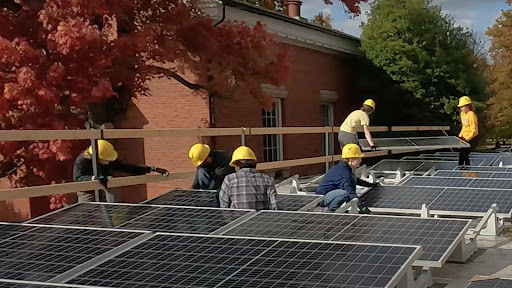

London DeJarnette ’24
The prestigious Pennsylvania Environmental Resource Consortium 2023 Campus Sustainability Champions honor was bestowed to Allegheny College student London Dejarnette, Solar Pilot Team, and Environmental Science & Sustainability Assistant Professor Matt Bethurem. This honor recognizes students, faculty, administrators, staff, student organizations, and non-student organizations of Pennsylvania schools who have made meaningful contributions to sustainability on their campus, community, or society.
London Dejarnette, a senior environmental science and sustainability and community & justice studies double major, has demonstrated a commitment to combating food insecurity.
Dejarnette has worked tirelessly to revive Allegheny’s chapter of the Food Recovery Network, which fights food waste by recovering and redistributing unused food from campus dining halls. In 2022, they interned for Zero Hunger with the Congressional Hunger Center to fight food insecurity.
The Solar Pilot Team is a group of students who installed a solar array at the Unitarian Universalist Church of Meadville, PA, as part of an independent study in the Department of Environmental Science and Sustainability led by Associate Professor Ian Carbonne.
After several months of working under full sun and subfreezing temperatures, the students completed a 14.7 kW system that should offset more than 80% of the church’s electricity consumption. Learn more about their project and hear directly from the students involved.

Student members are:
- Olivia Ave
- Ariana Clark
- Garrett Danielson
- Sarah Degrendel
- Leah Frase
- Lindsey Kutz
- Haley Pageotte
- John Prentice
- Kabir Shyamsundar Jipp
- Jacob Stiger
- Elsa Waidelich

Matt Bethurem
Matt Bethurem, an Assistant Professor of Environmental Science and Sustainability, spearheaded a local response to climate change in the community of Meadville, PA.
Bethurem led a team through a year-long process of gathering data for a local climate assessment and afterward co-authored a formal climate action plan that Meadville’s City Council adopted in March 2022. Today, Bethurem is a member of the environmental advisory committee, charged with enacting a climate action plan.
About the Pennsylvania Environmental Resource Consortium
The Pennsylvania Environmental Resource Consortium, a state-level organization in the United States, is a consortium of colleges and universities in Pennsylvania that collaborate to advance sustainability on member campuses, in local communities, and across the Commonwealth. PERC members share their success stories through conferences, workshops, webinars, web learning cohorts, and regularly emailed communications to help institutions learn from one another. In its more than 20 years of operation, PERC has spearheaded several major initiatives that have impacted sustainable campus operations, state and local level policy, community initiatives, and education. Such initiatives include food recovery, climate efforts, environmental justice, public environmental health, and campus sustainability champions. Through these initiatives, PERC member institutions can deepen their on-campus, community, and state-level impacts and networks, demonstrating that a collaborative networking consortium can have a greater impact on education, operations, and outreach in sustainability and environment arenas than individuals or institutions acting alone.
About Allegheny College
Allegheny College, founded in 1815, is one of the nation’s oldest and most innovative four-year colleges where multidisciplinary learning breaks the conventional mold. It is one of the few colleges in the United States with a unique requirement to choose both a major and minor for graduation, to provide students with a cross-disciplinary path in the sciences and humanities for educational depth and intellectual growth. Located in Meadville, Pennsylvania, Allegheny College is one of 40 colleges featured in Loren Pope’s “Colleges That Change Lives.”
The college has notable environmental sustainability accomplishments on campus, including carbon neutrality, on-campus solar energy production, organic food production, in-vessel food waste composting, and resource reduction. In the last decade, paper consumption has been reduced 30% and water consumption has decreased 40%. Installation of water refill stations on campus has drastically reduced single-use plastic bottle consumption. Recent building construction or renovations have been LEED-certified, including use of geothermal heating and cooling systems.


